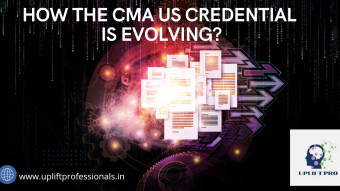Women in Management Accounting: Breaking the Glass Ceiling with US CMA
The role of women in management accounting has evolved over the years, and the Certified Management Accountant (US CMA) designation can be a valuable tool for breaking the glass ceiling and advancing in this field.
Here are some ways in which women can leverage the US CMA credential to enhance their careers in management accounting:
Professional Credibility:
The US CMA designation is globally recognized and respected. By earning the US CMA, women can enhance their professional credibility and demonstrate their expertise in management accounting and financial management.
Career Advancement:
Having the US CMA credential can open doors to higher-level positions and increased responsibilities within organizations. It signifies a commitment to professional development and a strong foundation in strategic financial management.
Global Opportunities:
The US CMA is recognized internationally, allowing women in management accounting to pursue global career opportunities. This can be especially beneficial for those seeking roles in multinational corporations or organizations with an international presence.
Networking and Community Support:
The Institute of Management Accountants (IMA), the organization behind the US CMA, provides a supportive community for professionals. Women can benefit from networking opportunities, mentorship programs, and resources offered by the IMA to advance their careers.
Skill Development:
The US CMA curriculum covers a broad range of skills, including financial planning, analysis, control, and decision support. Women in management accounting can acquire and enhance these skills, making them well-rounded professionals capable of contributing to strategic decision-making.
Flexibility and Work-Life Balance:
The flexibility of the US CMA program, which allows candidates to study at their own pace, can be particularly advantageous for women managing work, education, and family responsibilities. This flexibility supports a better work-life balance during the certification process.
Equal Recognition:
The US CMA credential is awarded based on merit and competence, irrespective of gender. Earning the US CMA provides women with a tangible and equal measure of recognition for their skills and accomplishments in the field of management accounting.
Diversity and Inclusion Initiatives:
Many organizations are actively promoting diversity and inclusion. Holding a professional certification like the US CMA can contribute to an organization’s diversity goals and showcase a commitment to supporting the career growth of women in management roles.
Leadership Opportunities:
The US CMA designation positions women for leadership roles in finance and management. It equips them with the knowledge and skills needed to take on challenging leadership positions, including CFO or other executive roles.
Inspiration for Others:
Women who achieve the US CMA designation become role models and sources of inspiration for others aspiring to break into management accounting. Their success contributes to the overall advancement of women in the profession.
It is important to note that while the US CMA can be a powerful tool, overcoming gender-related challenges in the workplace may also require broader efforts such as advocating for diversity and inclusion, mentorship programs, and addressing systemic barriers. Ultimately, the US CMA credential can play a significant role in empowering women in management accounting to achieve their career goals and contribute to the growth and success of their organizations.
For Further Information/Assistance: Contact Us





